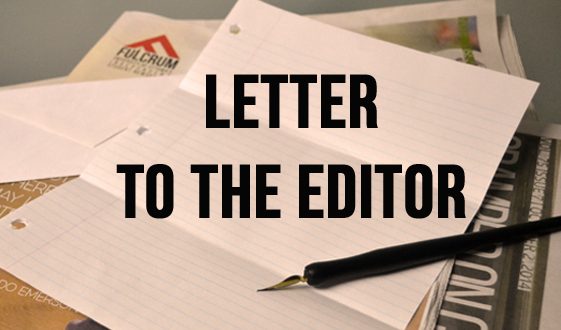Dear Editor,
I was eager to read my university paper’s culminating thoughts on the 2016 United States presidential election after its turbulent conclusion. It is, without question, a hotly debated global concern, and I know this school to have a burgeoning politically active community.
However, I find the content of your editorial “President-elect Donald Trump: A media bred monster” not only willfully neglectful of any insightful political analysis but also seemingly completely indifferent to the fundamental principles that retain the entire integrity of your own industry as a news publication.
The article writes: “When executed correctly, the media is a powerful weapon that can ensure accountability, demand change, and alert the public to causes for concern. Unfortunately, the U.S. media failed on all of these accounts when they turned a blind eye to the damage of condoning the antics of a man not fit to handle his own Twitter account, let alone the White House.”
From here you make the argument that as Trump gained more and more political traction by targeting minorities and immigrants, the tone of the media should have turned against him. Why? Because we, as the educated and civil “rightful minded,” should be able to dictate the tone in which information is being represented? We the gatekeepers of “public interest”?
Trump played on fear, hatred, and spectacle, propelled by a bottom line message of institutional failure that struck a chord with a mass undercurrent of American middle class disaffection which, according to every exit poll there is to dissect, was brought to victory by the titanic apathy on the part of the democratic vote.
The media didn’t aid and abed what was said by giving Trump airtime. They released information pertinent to this electoral campaign and the people listening, watching, clicking, reading, either condemned or condoned, or shrugged. But ever heard the saying “don’t shoot the messenger?”
Reporting “no candidate was receiving significantly more coverage with a negative tone than other candidates” and then going on to call that “problematic” is directly against the essence of what a news source should uphold.
You don’t want dubiously researched Buzzle articles on Facebook to dictate how people view the world, but patronize the actual impartial sources for being just that. As a university newspaper meant to ease the access to information and facilitate discussion, releasing staff editorials about why the media should be more biased is an odd choice. But it is, after all, still an opinion piece in the editorial section, where debate is catalyzed. So for the record, here is a tally of the public Presidential endorsements made this year by the editorial boards of publications across the United States and Internationally:
| Candidate | Daily | Weekly | Magazines | College | International | Total |
|---|---|---|---|---|---|---|
| Hillary Clinton | 243 | 148 | 15 | 77 | 17 | 500 |
| No endorsement | 64 | 13 | 0 | 5 | 0 | 82 |
| Not Donald Trump | 8 | 2 | 4 | 12 | 4 | 32 |
| Donald Trump | 20 | 6 | 0 | 0 | 0 | 26 |
| Gary Johnson | 9 | 0 | 0 | 0 | 0 | 9 |
| Split Endorsement | 2 | 0 | 0 | 0 | 0 | 2 |
| Evan McMullin | 1 | 0 | 0 | 0 | 0 | 1 |
| Not Hillary Clinton | 1 | 0 | 0 | 0 | 0 | 1 |
Source: Wikipedia.
Jim Rutenberg, the same journalist your article references, wrote that the endorsements against Donald Trump were distinguished by “blunt condemnation.” And these numbers don’t even count the Stephen Colberts, Seth Meyers, Jon Stewarts, Tevor Noahs, and John Olivers of the world, who amass a huge audience and viciously opposed the Trump campaign the entire way through. And still, only a little over half of the population of the United States even showed up to vote.
While I’m sure the Fulcrum is free from the web-based plague of clickbait articles with a title like “Donald Trump: Media bred monster,” I think you should be a little more perturbed by the people who (having heard all the highly publicized sound bites, read all the quotes, witnessed everything he did and everything he said via these “damaging” media outlets) voted for Donald Trump, or didn’t care enough to vote at all, rather than point fingers at those who reported it.
—Sarah Beltrame, third-year student at the U of O.




